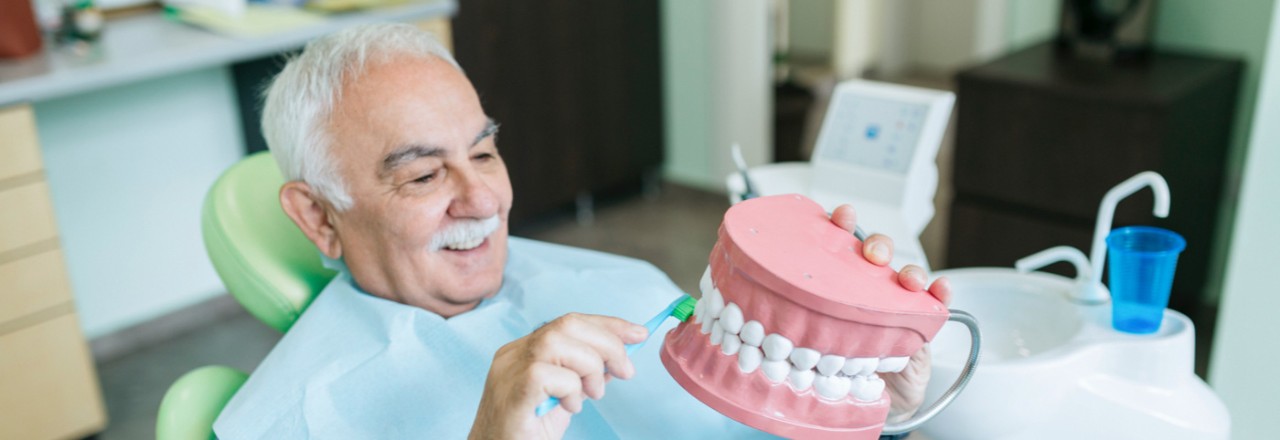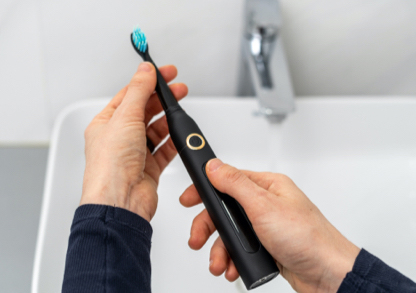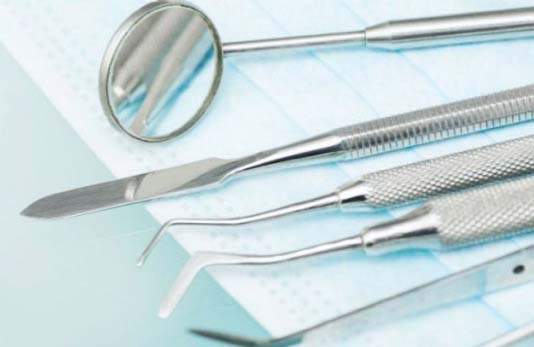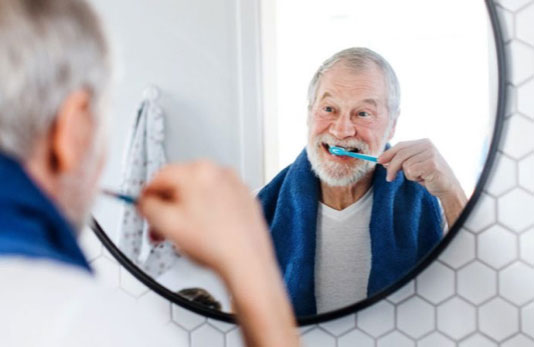Your game plan for healthy teeth

To win the dental health game, you have to understand the players and the field. Proper hygiene, diet and lifestyle are all key components of your winning strategy.
The home team
Toothbrushes
Your toothbrush is a star player, but choosing the right one can be challenging. Remember when the only difference between toothbrushes was color? Now you can choose from angled necks, narrowed heads, staggered bristles — how do you know which one is your best bet?
A toothbrush should bear the American Dental Association (ADA) stamp of approval (found on the package). It should also be labeled “soft” and have round-ended bristles, which means it's sturdy enough to clean teeth and stimulate gums without scouring them.
An electric toothbrush may help those who have difficulty brushing their teeth, although it's not proven to clean better than a regular toothbrush. And, remember, your toothbrush gets a daily workout, so replace it every two to three months, as well as after colds, to keep it in top shape.

Toothpaste
The ingredients in your toothpaste form a powerful defense, with fluoride as the key cavity fighter. Toothpaste also contains abrasives. Designed to clean and polish teeth, abrasives include silica, alumina, calcium or low levels of baking soda. If a paste is too abrasive, however, it may damage teeth, creating a place for bacteria to accumulate.
Many toothpastes boast anti-plaque or tartar-control abilities. Although you can brush plaque away with some toothpastes, manufacturers must prove to the ADA that their paste prevents gingivitis in order to claim that they fight plaque. Tartar, on the other hand, can only be removed by a dental professional. Tartar-control toothpastes won't defeat existing tartar, but they do help prevent further buildup.
Whitening agents can extend the brightness of your teeth after a professional cleaning. However, be aware that hydrogen peroxide, the active ingredient in many whiteners, may damage gums or tooth enamel.
Fluoride
Fluoride is another important defensive player. This naturally occurring mineral compound helps teeth retain calcium, keeping them strong. It also slows the production of acids that attack teeth. Fluoride is found in water and soil. It is also present in foods and beverages at varying concentrations.
Unfortunately, many communities have water supplies that do not contain fluoride, and more people today are drinking bottled water or using in-home filtration systems, further reducing their fluoride intake. Use a fluoride toothpaste, and consider a fluoride mouth rinse, which not only helps fight cavities, especially at the gum line, but also strengthens teeth.
Floss
Waxed, unwaxed, plain, mint, cinnamon — which floss you choose is up to you, as long as you use it correctly and regularly. Rather than leaving floss on the sidelines, try a floss holder or specially designed pick if you find it difficult to handle floss.
The opposition
Plaque
Your biggest rival is plaque — the sticky, colorless film that builds up on your teeth every day. Because plaque is invisible, you should periodically use a disclosing solution to see if you’re brushing and flossing effectively. You can buy a disclosing solution at a drugstore, or you can make your own by mixing two drops of blue or green food coloring with two teaspoons of water. Swish the solution around in your mouth, spit and then rinse with water. The color sticks to plaque, appearing darker where plaque is thickest.

Tartar
Tartar is the hard deposit on your teeth that only a dentist can remove. It occurs over time as plaque combines with the minerals in saliva.
Decay
The unwelcome successor to plaque and tartar is decay. When you eat, the bacteria in plaque transform the sugars and starches in food into acids, which attack the tooth enamel. If plaque is not removed regularly, the enamel breaks down, and teeth eventually decay.
Decay works from the outside toward the center of the tooth. If untreated, decay can reach the tooth pulp and form an abscess at the root end — usually causing tremendous pain. At this stage, a root canal or extraction may be necessary.
The field
Lifestyle
Did you know that your lifestyle can affect your oral health? People who are sedentary and eat poorly are more likely to develop periodontal disease than those who engage in high levels of physical activity and choose a healthy diet. Follow a healthy, active lifestyle and avoid alcohol and tobacco use to help keep your mouth in shape.

Diet
Your diet can work for or against you. Whether diet is on your side depends on the types of foods you consume, how often you eat and the length of time that food remains in your mouth. Some points about diet to keep in mind include:
- Limit sugar intake. Like most people, you probably eat your share of sugar-laden snacks and drinks. Sugar in any form, including brown sugar and the natural sugars found in fruit and dairy products, is a tooth's worst enemy.
- Consume starch with meals. Starchy foods are also suspect and should be eaten only as part of a meal. Carbohydrates, such as bread, pasta and potato chips, start as a starch, but then break down into simple sugars once you eat them. The sugars linger on your teeth until you brush them away. Carbohydrates work together with any bacteria in your mouth to create tooth decay, just like the sugar found in sweets do.
- Monitor frequency. The more often you snack, the greater your risk for hosting enamel-destroying acids.
- Eat "tooth-healthy" foods. The good news is that some foods may actually help counter tooth decay. Peanuts and aged cheddar, Swiss and Monterey Jack cheeses may actually inhibit or neutralize the acids that cause cavities.
- Brush after meals. Brushing after meals and snacks is essential and, combined with a balanced diet and healthy lifestyle, can help beat disease and decay at their own game, for stronger teeth and gums.
Last updated May 10, 2022
Related articles:
The oral health information on this website is intended for educational purposes only. Always consult a licensed dentist or other qualified health care professional for any questions concerning your oral health.


